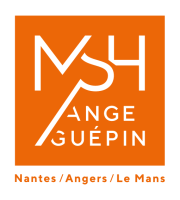
10:00 am
Simone Weil Amphitheatre
5 allée Jacques Berque, 44000 Nantes
PROGRAMME
Table ronde 1 : « Expérimenter l’interdisciplinarité » (10h - 12h).
Animatrice : Sophie PARDO (Sciences économiques, LEMNA, Nantes Université)
Bien que l’on puisse théoriser ou situer l’interdisciplinarité du point de vue des institutions qui la portent comme de celui d’une épistémologie générale des savoirs et des connaissances, l’interdisciplinarité est le plus souvent affaire de « vécu » ou d’expérience/expérimentation encouragée par certains programmes scientifiques. Ce vécu permet les découvertes, les remises en question, les prises de distance critique mais il est également jalonné d’obstacles et de résistances.
Cette table ronde se propose d’interroger quelques retours d’expérience de l’interdisciplinarité du point de vue de chercheurs.es qui y ont été confronté.e.s ou s’y sont essayé.e.s. La visée sera moins théorique qu’empirique. Nous posons que l’interdisciplinarité s’enrichit d’histoires individuelles et qu’elle repose sur le partage des acquis et des doutes.
Pierre-Étienne KENFACK, Directeur-adjoint IEA Nantes (Droit, Cameroun)
Mirjam KÜNKLER (Droit et Sciences politiques/Études islamiques, Allemagne)
Isabelle LIGIER-DEGAUQUE (Arts du spectacle, LAMO, Nantes Université)
François VIGNALE (Histoire & Humanités numériques, 3.LAM, Le Mans Université)
Table ronde 2 : « Qu’est-ce qu’une discipline ? » (13h30 - 15h).
Animateur : Franck LAURENT, Directeur-adjoint MSH Ange-Guépin (Littérature française, 3.LAM, Le Mans Université)
Il ne saurait exister d’interdisciplinarité sans disciplines clairement identifiées et solidement ancrées dans un contexte académique. Il faut pouvoir définir et comprendre la notion même de « discipline » afin de promouvoir rigoureusement leur rencontre et leurs interconnexions.
Cette table ronde se propose de revenir sur la question des disciplines académiques, qui pourront être abordées dans leur dimension historique (lieux et institutions de la connaissance), leur dimension culturelle (différence des cultures académiques : ex. sections CNU en France, studies en contexte anglophone, ect.) et leur dimension pragmatique (pratiques et méthodes spécifiques).
Florence NINITTE (Littérature du Moyen-Âge, Belgique)
Erick SOURNA LOUMTOUANG (Histoire contemporaine, Cameroun)
Aline DURAND (Histoire et archéologie du Moyen Âge, CReAAH, Le Mans Université)
Nathalie RICHARD (Histoire contemporaine, TEMOS, Le Mans Université)
Table ronde 3 : « La délicate notion de science » (15h30 - 17h).
Animateur : Frédéric LE BLAY, Directeur MSH Ange-Guépin (Langues, littératures et civilisations anciennes/Philosophie des sciences, CFV, Nantes Université)
Les différentes disciplines relevant du champ spécifié comme étant celui des Sciences humaines et sociales se heurtent immanquablement à la définition même de ce qu’est la science et de ce qui caractérise la démarche scientifique. Il peut arriver que certaines ne s’y retrouvent pas tout à fait, ainsi la recherche sur les arts ou la littérature – le terme « recherche » pouvant lui-même autoriser des registres de compréhension divergents ou renvoyer à des pratiques hétérogènes. La recherche comme la science peuvent se vivre en dehors du « laboratoire ».
Cette table ronde se propose de revenir sur ce paradigme de la science appliqué aux Sciences humaines et sociales, notamment dans leurs relations avec les autres champs de la science académique.
Valeria GUZMAN VERRI (Architecture et urbanisme, Costa Rica/Italie)
Ali HOSSAINI (Philosophie, États-Unis)
Karine DURIN (Langue, littérature et civilisation de l’Espagne moderne, CRINI, Nantes Université)
William PILOT (Histoire grecque, TEMOS, Université d’Angers)
The Institut d'études avancées de Nantes and the Maison des Sciences de l'Homme Ange Guépin invite you to a seminar on interdisciplinarity on Monday January 8, 2024.
Simultaneous English/French translation will be provided throughout the seminar.
Monday, January 8, 2024 from 10:00 a.m. to 5:30 p.m.
Simone Weil Amphitheatre
5 allée Jacques Berque, 44000 Nantes
The event is free and open to all.
Registration required via this form.
This new format for MSH Ange-Guépin's historic seminar "Penser l'interdisciplinarité aujourd'hui" ("Thinking about interdisciplinarity today") aims to engage the regional community of researchers in the Humanities and Social Sciences, as well as the fellows of the Institut d'études avancées (IEA) de Nantes, in a process of joint reflection.
The introductory session will raise and discuss a series of questions relating to the understanding and challenges of interdisciplinarity, MSH's field of expertise and action. At this initial stage, the aim will be to encourage the researchers present to reveal the specificities of their disciplines, their objects, their methods and their definitions. These initial exchanges will raise questions and bring out the inevitable points of mutual enrichment and dialogue.
This epistemological phase will be organized into three round tables. The exchanges that take place will be designed to encourage interdisciplinary collaboration and prepare for subsequent seminars.
PROGRAM
Roundtable 1: "Experimenting with Interdisciplinarity" (10:30 am - 12 pm).
Facilitator: Sophie PARDO (Economic Sciences, LEMNA, Nantes University)
Although one can theorize or situate interdisciplinarity from the perspective of the institutions that support it or from that of a general epistemology of knowledge and understanding, interdisciplinarity is most often a matter of "lived experience" or experimentation encouraged by certain scientific programs. This lived experience allows for discoveries, questioning, critical distance, but is also marked by obstacles and resistance.
This roundtable aims to examine some feedback on the experience of interdisciplinarity from the perspective of researchers who have faced it or have attempted it. The focus will be more empirical than theoretical. We posit that interdisciplinarity is enriched by individual stories and relies on the sharing of insights and doubts.
Pierre-Étienne KENFACK, Deputy Director IEA Nantes (Law, Cameroon)
Mirjam KÜNKLER (Law and Political Science/Islamic Studies, Germany)
Isabelle LIGIER-DEGAUQUE (Performing Arts, LAMO, Nantes University)
François VIGNALE (History & Digital Humanities, 3.LAM, Le Mans University)
Roundtable 2: "What is a Discipline?" (1:30 pm - 3 pm).
Facilitator: Franck LAURENT, Deputy Director MSH Ange-Guépin (French Literature, 3.LAM, Le Mans University)
There can be no interdisciplinarity without clearly identified disciplines firmly rooted in an academic context. It is necessary to be able to define and understand the very concept of a "discipline" in order to promote rigorously their intersection and interconnections.
This roundtable aims to revisit the question of academic disciplines, which can be addressed in their historical dimension (places and institutions of knowledge), their cultural dimension (differences in academic cultures: e.g., CNU sections in France, studies in an Anglophone context, etc.), and their pragmatic dimension (specific practices and methods).
Florence NINITTE (Medieval Literature, Belgium)
Erick SOURNA LOUMTOUANG (Contemporary History, Cameroon)
Aline DURAND (History and Archaeology of the Middle Ages, CReAAH, Le Mans University)
Nathalie RICHARD (Contemporary History, TEMOS, Le Mans University)
Roundtable 3: "The Delicate Notion of Science" (3:30 pm - 5 pm).
Facilitator: Frédéric LE BLAY, Director MSH Ange-Guépin (Languages, Ancient Literature and Civilizations/Philosophy of Sciences, CFV, Nantes University)
The various disciplines within the specified field of Humanities and Social Sciences inevitably grapple with the very definition of what science is and what characterizes the scientific approach. Some disciplines may not entirely align with it, such as research on arts or literature – the term "research" itself allowing for divergent understandings or referring to heterogeneous practices. Both research and science can be experienced outside the "laboratory."
This roundtable aims to revisit the paradigm of science as applied to Humanities and Social Sciences, especially in their relationships with other fields of academic science.
Valeria GUZMAN VERRI (Architecture and Urbanism, Costa Rica/Italy)
Ali HOSSAINI (Philosophy, United States)
Karine DURIN (Language, Literature, and Civilization of Modern Spain, CRINI, Nantes University)
William PILOT (Greek History, TEMOS, University of Angers)
